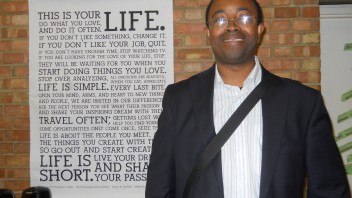
Walking out of the station and down the famous Electric Avenue, a busy street market with stalls full of exotic looking vegetables, independent brightly coloured shops selling vibrant materials and reggae music blasting out from shops’ waterproofed speakers, I feel the excitement of being somewhere different. This short video about the Brixton Pound gives you a feel for the place:
Unfortunately the feeling didn’t last long as I soon hit the main street full of chain stores, rushing people and endless buses splashing their way past. I turned down a side street and spotted Duncan’s house, the only one with beans growing in the front garden, a sure sign of a Transition resident. Before long about 10 of us were tucking into a local lunch and talking about the enterprises emerging from Transition Town Brixton (TTB).
The enterprises
Brixton Energy was one of the first co-operatives to emerge here (part of Re-powering South London). Their first project, based on a community share issue, was to cover the roofs on a local housing estate with solar PV, and this model is being repeated on the same estate in round two – share offer now open!
Community Draught Busters – the original model on which Belsize Park and some other Transition versions are based – started 2 years ago and is now a social enterprise, providing paid work for 2 people. It runs on a part funded (for lower incomes – contracts are in place with local councils), part-revenue (able to pay) model.
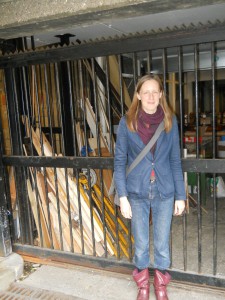
Hannah of Remakery in front of the new premises
The Remakery Brixton is a co-operative that is developing a shared workspace, educational space, and incubator for local enterprises and projects, based on the re-use, repair and upcycling of resources that would otherwise go to waste. Using funding from Lambeth Council, it has taken on 40 unused garages below a housing block. Local people will be trained in the art of fixing, mending and refitting items that can then be sold…
“It will support a community of ‘Remakers’ – entrepreneurs, makers and local residents with a passion for creative and practical re-use – helping them to realise their visions by learning new skills, turning ideas into real projects, hobbies into enterprises, and start-ups into sustainable businesses”.
The Brixton Pound (B£) is a local currency launched in 2009 that’s in use with around 200 local businesses, including some market traders. The printed notes are beautiful and serve an important purpose, but most people are used to debit/credit cards and cash doesn’t work so well for business to business trading. So an electronic, mobile phone text based system was launched in 2011 – essential if these alternative money schemes are to scale up, in my opinion. This is part of a wider pilot scheme for electronic local currencies that includes the Bristol Pound.
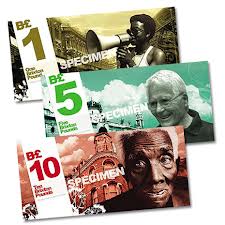
Brixton Pounds
In June the B£ team announced that Lambeth Council’s 3,000 staff can use Payroll Local from this autumn, where they choose to receive a small portion of their salary in electronic Brixton Pounds (B£e). They have just launched a project to get local people (not just businesses) engaged in selling their skills, services and goods for B£s. And hot off the press, as of 30th August local businesses can pay their business rates in B£.
Sue is also looking at setting up the ‘Peoples’ Pound’ as another means of exchange. This is ‘person to person’ banking where people trade with each, rather than shop for what they need. It encourages direct exchange and bartering or just sharing anything at all – excess food, garden equipment, previously loved furniture or clothes.
As a way of finding people and resources to seed and grow the exchange system and business model, Sue has developed a 6 week money management programme, for 2 hours each week within a community centre, starting in September (hopefully we will be able to share this more widely). This links with Community Draughtbusters and the Transition Livelihoods film being developed with Sue, Sibylle, and Martin to bring the conversation about new forms of work and making a living onto the internet (more on this project will be announced soon!).
Linked enterprises and organisations
London Creative Labs (LCL) is a small social enterprise working with hard to reach unemployed people in Brixton. The co-founders of LCL, Sofia Bustamante and Mamading Ceesay are longtime collaborators with TTB, most notably Mamading chaired and hosted the TTB Business and Economy group and the Brixton Pound group pre-launch.LCL is a sister organisation – sharing thinking and working together, it has provided support to TTB as an organisation and to individual members of TTB.
Here’s a short video that introduces LCL’s approach to helping people create their own jobs:
LCL works with people who want to work, but can’t find any. They are invited to join the 12 week Skills Camp programme that will teach them career coaching skills they can use to help themselves, family members, friends and neighbours. For 3 hours a week, they explore what skills and personal assets they have, and also learn how to help other people find their own capacity to contribute. Rather than finding paid work from others, the aim is around work creation via one day Social Startup Labs workshops, and attendees will soon hopefully also be supported in bringing their own ideas into being through the Social Startup Incubator. The outcomes are very promising so far with many stories of personal transformation and increased community cohesion as well as people moving closer to the job market.
Makerhood, another enterprise that is linked to TTB rather than having been spun-out of it, started a year ago, 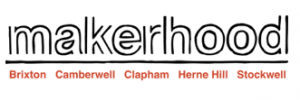 when the founders noticed there was no easy way to find stuff that was made locally. If you needed a new table, you generally went to IKEA! UnLtd funding helped them establish a website that connected local makers, and provided an online shop window for local people.
when the founders noticed there was no easy way to find stuff that was made locally. If you needed a new table, you generally went to IKEA! UnLtd funding helped them establish a website that connected local makers, and provided an online shop window for local people.
The demand for networking and connection by often isolated makers has led to a strong offline community, including business development workshops and social events for both professional and hobby makers in Brixton. Makerhood has also run sessions teaching the general public new creative skills. Connections with the local market traders association has led to monthly Makers’ Markets and a more visible presence. The directors are looking at how to roll out other local Makerhoods and develop their longer term financial sustainability.
Also present were Sue and Kees from Lambeth council, both TTB members as well as working in the councils’ Green Livelihoods group and on various sustainability projects. It sounds like Lambeth Council are good supporters of TTB’s work. Himi was also there, a newly appointed paid worker for the local Market Traders Association, a powerful local group, and she has also been very active with the Brixton Pound. I’m impressed by the level of connection between various organisations.
Joining it up
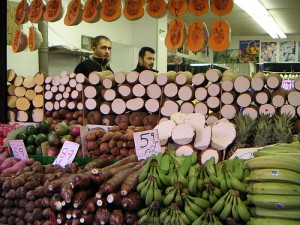
Brixton Market
With such a range of things going on, it wasn’t a surprise to hear that everyone wanted more opportunity to connect their work, and find the synergistic opportunities.
For example, the London Creative Labs work can produce potential makers for the ReMakery to train, or provide the facilities for them to work, and the connection to the Market Traders Association might help get another sales outlet for these goods. Makerhood’s members might also find the facilities useful.
TTB has gone through process of forming, then creating working groups, out of which emerged projects and new enterprises. These often meant the working group (or even the core group) stopped meeting, and the energy went into the projects/enterprises.
This left a bit of a vaccum at the core of TTB while people got on with their projects, and there was a bit of a sense of having lost unity, an overall focus. This is seen as a potential problem in maintaining ‘Transition’ as the bigger story, and providing strong central project support. But clearly much has been accomplished here, and this flow seems to have been natural as people followed their passions.
Our meeting perhaps just highlighted this, and raised a stronger intent to reflect and re-group, and refocus the efforts of TTB. This refocusing will likely be around exploring the potential for a new local economy, and the role TTB might play in this. How might they build on the great set of enterprises listed above, and scale it up? This might start with identifying the potential members of a local economy strategy group, those with an interest in or a responsibility for local economic development, and bringing them together to do some visioning work.
It was felt that this focus presents a new story to tell the local community – the debate has moved on from peak oil and climate change to economic uncertainty, so this can bring in different/more people. But the question is how to resource this work? And what have others done that might help inform their strategic approach? TTB has accomplished all this with no core funding so far (they do have their Transition Centre, for meetings and activities – currently being used as an office by the Remakery).
These questions about resourcing our Transition work come up in every place I have been, and I’ll reflect more on that in my summary – some ideas and options are emerging to address both how to resource the work, and how to take a more strategic approach (for those that want to).
Fiona Ward, August 2012.
Main image: Mamading from London Creative Labs at one of their group workshops for the long term unemployed.

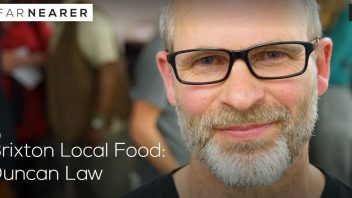


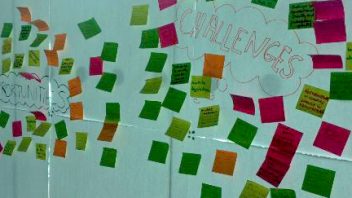


Connect